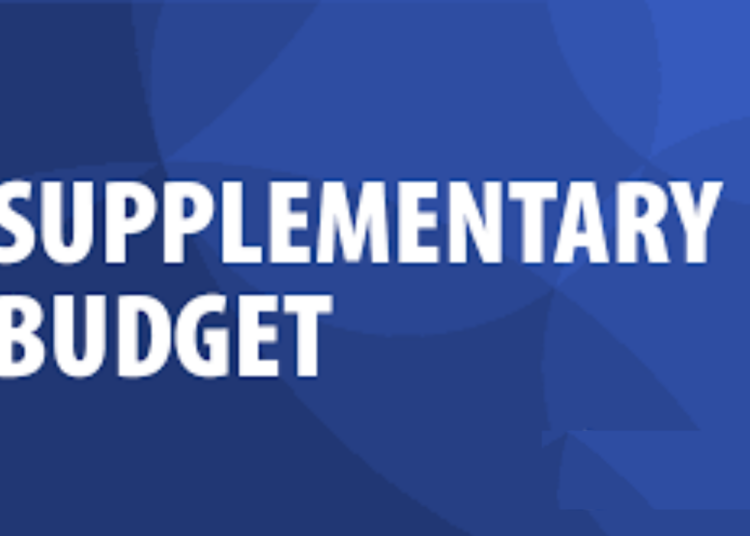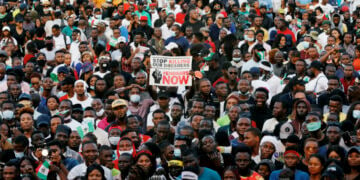Barring any last last-minute change of mind, the National Assembly will soon approve a N2.18 trillion supplementary budget for what is left of the 2023 financial year. While unveiling the budget, the federal government said it would be channeled towards funding national defense and security as well as the provision of welfare packages for Nigerians.
We would have thought that the year was far spent to warrant the demand for such a humongous sum given the realities in the nation’s economic space. Also considering the fact that, since assuming office, President Bola Ahmed Tinubu, has repeatedly asked Nigerians to make sacrifices and believe that things will improve, such free spending would be the last thing on his mind.
Curiously, it seems, in our view, that the belt-tightening is not for everybody. The 2024 budget ought to have taken care of those items. The situation cannot be worse than what it is now before that Appropriation bill is passed to justify the haste in applying for the supplementary budget.
With about 130 million citizens, by government’s own statistic, living under multi-dimensional poverty, the ever-increasing unemployment, deteriorating state of security, the government’s plan to prioritise security and citizens’ welfare is, admittedly plausible even as those items have already been provided for in the in-coming budget.
A breakdown of the supplementary budget indicates that N605 billion was earmarked for national defense and security; N300 billion was set aside for the repair of bridges and construction, rehabilitation and maintenance of roads across the country.
Interestingly, the government earmarked N210bn to fulfil its commitment to labour in line with its pledge to pay N35, 000 each to about 1.5 million employees of the federal government for the months of September, October, November and December 2023.
Other details of the budget showed that N400 billion was allocated for cash transfer payments where the government intends to pay N25,000 to 15 million households. However, other items in the budget cast doubts on the government’s commitment to drastically cut down the high and vexatious cost of governance.
For instance, why should a whooping N6.9 billion be earmarked for the purchase of luxury vehicles at a time Nigerians have repeatedly lampooned the National Assembly for its outrageous vehicle expenditure?
Based on the supplementary budget, the government intends to spend N7 billion on the renovation of the President’s and vice President’s official residences in Lagos and a staggering N1.5 billion for the purchase of vehicles for the First Lady.
Other items on the budget include the N5.8 billion for purchase of SUV vehicles and replacement of operational pool vehicles out of the N28 billion earmarked for the State House even as N2.5 billion is approved for the renovation of Aguda House while computerization and digitalisation of the State House was allocated N200 million.
Curiously, the government earmarked N1.5 billion each for acquisition, renovation and rehabilitation of two EFCC forfeited quarters as State House Complex annex at Mabushi and Guzape areas. If these houses were forfeited, from who is the nation acquiring them? Clearly, there is no justification for some of the expenditures outlined in the budget considering the current economic situation in the country and the asphyxiating huge debt burden.
Knowing the calibre of members of the National Assembly, the budget is sure to get expeditious passage by the two chambers. We won’t be surprised to see a speedy passage from lawmakers who used N75 billion to purchase luxury vehicles for themselves.
In our considered opinion, this sort of expenditure presents the nation as having spending as opposed to revenue problems. If expenditure profile such as this do not pass for misplacement of priorities, nothing else will.
But how is the government going to fund this? Aside from plans to use revenues accruing from the removal of subsidy on petrol, the government is also looking at exploring options of sourcing money from the debt market through borrowing.
Minister of Budget and Economic Planning, Abubakar Bagudu was emphatic when he noted that “It is not anticipated that there would be borrowing, but to the extent there will be, the debt management office will raise it. This is not recourse to Ways and Means,”
Sadly, the government is gearing up for more loans. Based on the new Medium Term Expenditure Framework (MTEF) and the Fiscal Strategy Paper (FSP), the Federal Government plans to take N26.42 trillion as loans between 2024 and 2026 with debt servicing projected to gulp N29.92 trillion in three years.
The data further show that for 2024, the government plans to borrow N7.81 trillion being N6.04 trillion and N1.77 trillion from local and foreign creditors respectively. By 2025, the Federal Government plans to borrow N8.54 trillion.
What this portends for the economy and Nigerians as a whole is not immediately perceivable. But we are worried that in the medium- to- long term, the effect, when it begins to manifest, will definitely question the desirability of mortgaging the future of generations yet unborn.
To that extent, we are of the opinion that collapsing that budget into the 2024 Appropriation Bill maybe the fitting thing for President Tinubu to do.





